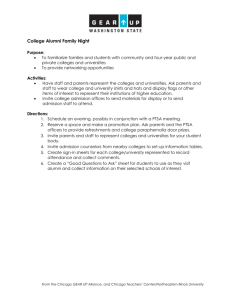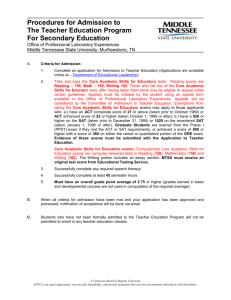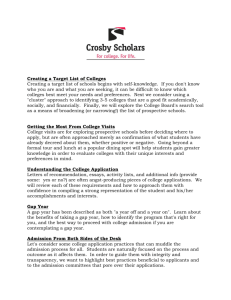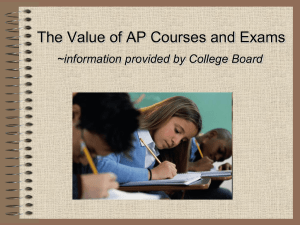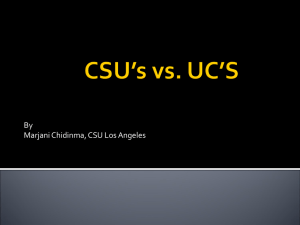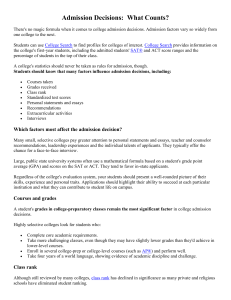Junior Parent Coffee 2015
advertisement
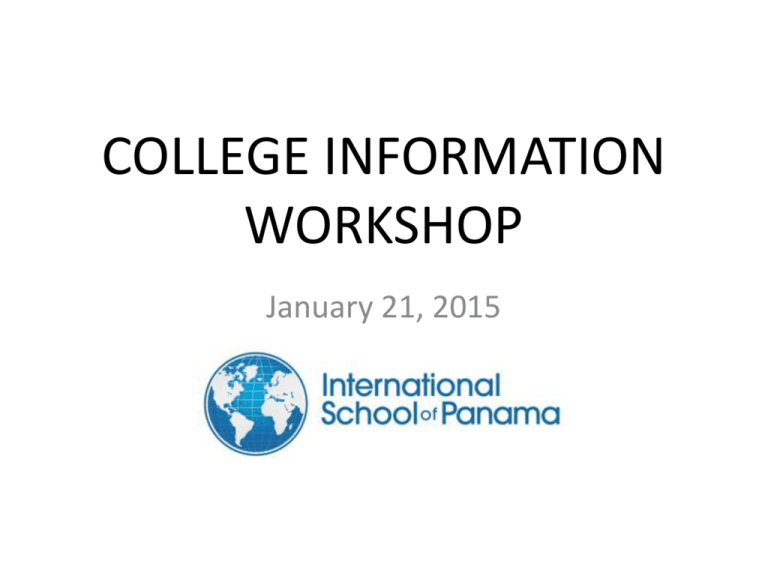
COLLEGE INFORMATION WORKSHOP January 21, 2015 Today’s Agenda • Introduction • General Information – What to think about when choosing a University • Regional Information – US/Canada – Latin America – Europe/UK • Specifics – Who? What? Where? When? How? • Q&A Next Step Options • • • • University program Gap year Work Military service What Universities Look For • • • • • Strong academic program Academic performance Well-rounded individual Strong sense of self/purpose/goals Someone who fits with their university community • International students or students with international backgrounds Myths and Realities • You do NOT need to decide on your career before you choose a college. • There are excellent colleges you have NOT heard of. • You should NOT necessarily go to the most prestigious college to which you are admitted. • The quality of the academic program in which you’re interested may NOT be the most important characteristic when choosing a college. Finding a Fit What does the “Right” Fit feel like? STUDENTS • What is the right fit? • How do I know what fits and what doesn’t? • What factors should I consider when trying to find the right fit? Specific Factors to Consider When Trying to Find a Fit • Size and enrollment • Location • Academic programs • Cost/Affordability • Campus Life • Residential Life • Personal Factors Size and Enrollment • Small, medium, or large • Undergraduate or graduate focus • Diversity - Geographic, socioeconomic, ethnic, religious, gender, international students • Retention – do the students come back year after year? Location • Distance from home • Geographic Setting – Urban, rural, suburban • Climate • Transportation – within and to home • Family/friends nearby Academic Programs • • • • • • • • • Do they have my course of study/major? Am I interested in the classes/modules? Quality and accessibility of facilities Honors/special programs Faculty – Teaching or research focus – Availability, Advising, Credentials Average class size and largest intro class Hands-on learning, small seminars & community engagement, or lectures Nurturing or Competitive Environment Internships/Placement/Work experience Cost/Affordability • Cost – tuition, fees, room and board, travel, miscellaneous expenses • Cost of Living • Financial Assistance loans, grants, public, private, college • Scholarships Campus Life • • • • • • • • • Athletics – what types? Student government Theater, Music, Arts Service Social scene Clubs Study Abroad Security Sense of Community Residential Life • Is it a residential campus or do students commute to and from campus? • What percentage of students live on campus? • Do 2nd, 3rd, 4th year students live on campus? • Am I required to live on campus? • How are roommates chosen? • Food – cafeteria/own kitchen? • Co-ed/single sex College Research is about Finding a Right School for You • Finding a university is like shopping for a car or buying a house • There is more than one perfect college • Build a list by trying to identify schools that will help you personally – where you will be comfortable but yet feel stretched • Be open to new ideas and possibilities Studying in North America Higher Education in North America United States (> 3000) • 2-year Community Colleges/Junior Colleges • 4-year Public Universities and Colleges • 4-Year Private Universites and Colleges (independent, religious affiliations, gender, ethnicity, other) Canada (>100) • Both 2-year (college) and 4-year (university) • Majority are government funded Characteristics of a North American Education • 4-year undergraduate Bachelor’s degree • Additional degree programs may require 5-6 years (e.g., architecture) • General education requirements – first year of study • Selection of ”major” does not need to be declared until the 2nd year of study. Can change major • Options: – changing universities with transfer of credits – double major – minor Admission Considerations U.S. and Canada • High School Academic Performance • • • • • Rigor of courses taken GPA Specific courses taken Transcripts (sent three times in application process) Final Evaluation Admission Considerations U.S. and Canada • ISP Diploma – Accredited by AdvancED in U.S. • IB Diploma – Not generally needed for admission – May confer advanced standing (sophomore level) – Can obtain college credit depending on IB exam scores – Can eliminate the need to take certain 1st year courses Admission Considerations – U.S. • College Admissions Tests – SAT, SAT Subject tests, ACT and Test-optional schools • TOEFL test or equivalent for English compentency • Personal essays • Letters of recommendation • Talents – (e.g., athletic, artistic) • Extracurricular activities • Work experience • Disciplinary actions • Demographic considerations (e.g, gender, race, citizenship) U.S. Applications • Admissions – Early decison/early action, Regular admission, rolling admissions, deferred, waitlisted • Every university has its own application, process, requirements and deadlines • Need to research individual universities to determine application process Canadian Applications • Each university has its own application requirements (except Ontario) • Application process is straightforward • Most important factor for admission: Academic performance • Students generally apply to a specific program • Deadlines vary but tend to be later than in the U.S. Latin America and Mexico • Generally requires 4-5 years for Bachelor’s degree depending on the field of study • Some countries have special entrance exams (e.g., Chile, Ecuador, Mexico). Similar to SAT/ACT exams. • Some have language proficiency exams (e.g., Brazil, Argentina) • Both public and private universities & institutions exist. Costs vary. What you can study varies depending on the institution. • Admission requirements vary. Check individual university. Applications are not centralized. Panamá • Public and Private Universities • Students need to have received the Panamanian Diploma to be eligible for admission • Some majors require entrance exams (e.g., medicine) • Admission decisions are based on exam performance and HS academic performance Panamá • Florida State University & University of Louisville • Can complete full Bachelor’s in Panama or do 2+2 program – final 2 years in US (at reduced tuition rate) • Admission requirements are less stringent than FSU in the US • Cost effective. General education requirements completed in Panama • Numerous degrees (above and beyond Business) Studying in the UK andEurope Higher Education in UK • More than 100 universities • Other colleges and institutions offering undergraduate courses • Independent, self-governing bodies • Students apply through UCAS website • October 15th deadline for certain programs (i.e. Cambridge and Oxford, medicine, dentistry, and vet science) Characteristics of a UK/European Education • Normally three years for a Bachelor degree • Students select a particular course when they apply • Students normally stay at the same university for the whole degree program • Most universities require the IB Diploma Admission Considerations – UK • Students receive a ’conditional offer’ from the university which normally includes both overall IB score and specific IB scores in individual subjects • The university websites / UCAS give an indication of the likely offers for each university and course – but these are only guidelines for applicants • It is important to check the specific requirements for individual courses/majors regarding which subjects are needed and likely IB scores which will be required Admission Considerations UK/Europe • IB Diploma points (e.g. a total of 32 points) • Specific subject requirements (e.g. including a 6 in Chemistry at Higher Level) • English language requirement e.g., TOEFL test, IB English • Specific entry tests (e.g. BMAT or UKCAT for medicine) • Vary from course to course and university to university – do your research! Admission Considerations in other European Countries • The application process varies from country to country, and university to university • Check individual websites for specific admission requirements, exams, language proficiencies • Check the IB website for information about IB acceptance in different countries North American-Style Universities in Europe • Increasing number of US-style Universities • Have US accreditation from parent university or government recognition in host country • Goal – educating students to be globally minded and appreciate interdependence • Liberal arts/science curriculum. Majors in business, economics, engineering, sciences, humanities • Requirements for admission – vary with the university Who? What? Where? When? How? The Specifics Role of the Student • • • • • • • • This is your process to lead and manage. Maintain good grades. Study for exams. Be active in extracurricular activities. Stay balanced. Research colleges. Identify choices based on interests, abilities, and goals. Write college essays/personal statement. Ask 2 teachers for letters of recommendation. Complete the applications. Make sure you know what each university requires including supplemental material. Be aware of deadlines. Remember academic performance is critical. Where to find Information • • • • • • Use multiple sources General University Search websites University websites Mr. Scoggin and Ms. Kuziel Reference material in the ISP library Parents, teachers, family friends, individuals who are working in careers of interest • Open house days, college fairs, college visits • Former students who have gone, or are going to a university General Search Sites • • • • US – www.petersons.com Canada – www.aucc.ca UK – www.ucas.com/students Worldwide – www.braintrack.com -13,000 schools in 190 countries • IB – www.ibo.org Will provide information on other countries and IB diploma recognition Sign up for these exams! College Entrance Examinations • ACT – American College Test www.act.org • • • • • • • • View “Test Dates in Other Countries” Dates: April 18 (Deadline March 13) & June 13 (Deadline May 8) Take “ACT plus Writing” option ISP is a test center! ISP Center Code: 870200 (tells them where you want to take the test) High School Code: 882570 (tells them you are an ISP student) Content: Mathematics, Reading, Science & Writing Duration: 3 ½ hours Cost: $80.50 College Entrance Examinations • SAT – Scholastic Assessment Test • View “International Test Dates” • Upcoming Dates: – May 2 (Deadline April 6) & June 6 (Deadline May 8) • • • • • • • ISP CEEB Code: 882570 (this tells them you are an ISP student) ISP is a testing center! Test Center Code – 91650 Duration: 4 ½ hours Content: Critical Reading, SAT Writing, SAT Mathematics Possible score: 800 in each section Cost: $81 SAT Subject Tests - offer you an additional opportunity to show colleges what you know and what you know you can do (i.e, Chemistry, Mathematics, Biology, Literature) • www.collegeboard.org TOEFL Test of English as a Foreign Language • Test Combines the following four skills: – Listening, Reading, Speaking and Writing • • • • • • Test administered via the Internet (iBT) Location: area Panama universities Strongly encouraged to take TOEFL now! Score: Four scaled scores Duration: 4 ½ hours Current 2015 Test Dates –January 24, January 31, February 28, March 7, March 21, April 25, May 2, May 23, June 6 • Cost: $165. • www.ets.org/toefl SAT and ACT Which one should I take? • Two very different tests but with the same purpose – to provide an estimate of first-year college academic performance. • Both exams are accepted by universities for admissions. • Colleges use standardized tests in a variety of ways, and it varies from school to school. • More than 800 schools in the U.S. are test optional. www.fairtest.org ACT → content based • • • • ACT assesses what students should already know by measuring what a student has learned in school. (More like an achievement test) Test Format: English, Mathematics, Reading, Science Reasoning, and (optional) Writing Test. Scoring: No scoring penalty. Format encourages guessing. ACT Writing Test – in some cases acts as a substitute for SAT Subject Test requirement. SAT → problem solving • • • • SAT attempts to measure critical thinking ability, particularly in the area of problem solving, as well as test-taking skills. (More like an aptitude test). Test format: Critical Reading, Writing, and Mathematics – equally weighted. Scoring: Scoring is adjusted for incorrect responses (1/4 credit). SAT Subject Tests: hour-long, content-based tests that allow you to showcase achievement in specific subject areas where you excel. Our Advice: Take BOTH tests! Class of 2016 College Planning Schedule • To do: 11th Grade Parent Coffee (done!) Sign up for the TOEFL, ACT (April 18 and June 13) and SAT (May 2 and June 6) Look for upcoming university visits and attend them Meet with your school counselor at ISP Develop a list of college and university choices Ask your current 11th grade teachers for recommendations in May Use your summer wisely! If applying to the U.S., get started on your college applications Brainstorm your application essays /personal statements (several drafts = high quality) Review and fine tune your college list. Continue your research. When traveling, visit a college or university! Role of the Parent • Support your son or daughter. • Offer suggestions and ideas. Ask questions. Offer things to think about. • Help your son or daughter be organized. • Remember that it’s your child who is going to college, not you. • Stay balanced. Enjoy time together. • Remember that there are many ”fits” for your son/daughter. Role of the ISP Counseling Office • Provide individual sessions with students and/or parents to discuss college plans • Help student research colleges, prepare applications, write statements/essays • Coordinate the UCAS/UK application process. Prepare school reference • Submit all non-online applications • Submit all paperwork required by universities – transcripts, predicted grades, letters of recommendation, etc. ISP High School Counselors • Nina Kuziel (A-K) akuziel@isp.edu.pa • Sam Scoggin (L-Z) wscoggin@isp.edu.pa • Naviance Family Connection http://connection.naviance.com/isop (students will receive password)
